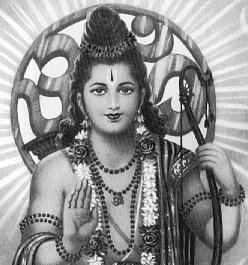
Honour
Your Word And Promise
"Today, in the purcuit of power, men ore prepared to commit any kind of crime
and to inflict any kind of harm on people to achieve their ends. Rama, on the
contrary, gave up the kingdom to honour the pledge given by his father and
chose to face the ordeals of life in the forest as an exile. He demonstrated
to the world that one should never go back on his plighted word. Rama gave up
his throne and became a denizen of the forest. In life, it is not difficulties
and calamities that are important. The supreme importance of truth was what
Rama wanted to hold forth to the world. One should never go back on his pledge
even at the cost of one's life. Today, however, men go back on their words
from
moment to moment. They indulge in falsehood at every step. Promises are
forgotten. How can the Rama Principle flourish in such a human environment?
The Rama Principle is remote from such an atmosphere. God will be in proximity
only to those persons whose thoughts, ideals and deeds are in accordance with
Rama's. Rama was a man of his word. But man is the very reverse." Sai Baba,
SS. 5/95, p. 115
Respect For
Parents
"If you really value Rama's ideals, you should practise them. You may say that
the high ideals of Rama are beyond your competence. But there is one thing,
which you can do. Rama carried out the words of his father (pitru-vaakya
pari-paalan). How many today respect the words of the parents? If the father
asks the son, 'Son, where are you going?' He replies 'Shut up and keep quiet in
your place.' Few have respect for the words of the father. There is no need to
speak about the respect for the mother. Such unworthy sons are ruining the
world. Mothers are shedding tears over the behaviour of such sons." Sai Baba,
SS. 5/95, 118
Rama's Gratitude
"The first pronouncement which Rama made on the occasion of the coronation is
remarkable. He said.' Who is it that is primarily responsible for making today's
celebration possible? Hanuman was solely responsible for the successful search
of the whereabouts ofSita and helping me to recover her. Hence, at the outset, I
express my deep gratitude to Hanuman.' Rama then expressed his gratitude to
Jataayu, who sacrificed his life in fighting against Ravana while he was
carrying away Sita. Next, Rama expressed his gratitude to Sugriva, who had
helped him, in organizing the search for Sita and in providing the hordes for
the war on Ravana. He then expressed his gratitude to Vibhishana, who had come
over to him, despite the suspicions of Rama's companions, and who had revealed
to Rama many of the secrets of the enemy. Above all, there were the huge hordes
of monkey, who had no direct connection with Rama or Sita, who endured many
hardships and even laid down their lives for his sake and he expressed his
gratitude to one and all who had helped him in the epic Rama-Ravana battle.
The supreme lesson to be leamt from the Ramayana is that one should be grateful,
in all one's life, to anyone who has helped him in a crisis. Only the man who
shows such gratitude can be termed a human being. The ungrateful person is a
demon. The human and the demonic are not different in external appearance. It is
by one's actions that one is called human, demonic or divine."
Sai Baba, SS, 6/96, pp. 142 & 143
